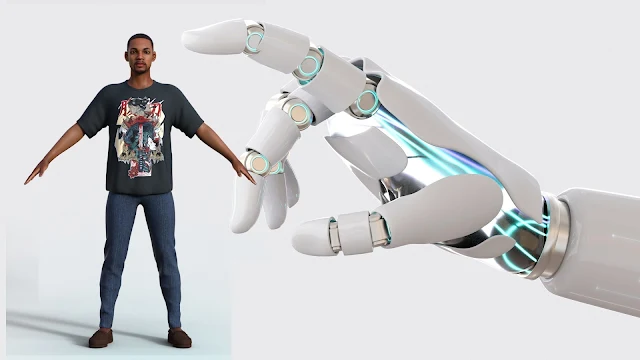AI-Generated 3D Models: Today and Tomorrow
In the ever-evolving landscape of technology, AI (Artificial Intelligence) continues to be a driving force behind groundbreaking innovations. One of the domains where AI is making a significant impact is in the world of 3D modeling. AI-generated 3D models not only accelerate the creative process but also democratize access to this sophisticated technology, making it accessible to a broader audience. This paradigm shift in 3D modeling holds the potential to reshape industries, from entertainment and healthcare to design and education, in ways previously unimaginable.
So let’s delve into how AI is revolutionizing 3D
modeling, which enables users to effortlessly transform any photo into a 3D
model.
AI's Role in 3D Modeling
Traditionally, 3D modeling was a labor-intensive
and time-consuming process, often requiring extensive manual work by skilled
artists and designers. However, AI has changed the game by automating and
streamlining many aspects of this creative discipline. The ability to transform
photos
into 3D models has been a game-changer, allowing even those with
limited technical skills to create intricate 3D models.
Furthermore, AI not only expedites the modeling
process but also enhances precision and consistency, ensuring that even complex
structures are replicated with remarkable accuracy, all while significantly
reducing the margin for error. This newfound efficiency has the potential to
unleash a wave of innovation across industries that rely on 3D modeling, from
architecture and manufacturing to entertainment and beyond.
Create 3D Models Online: The Accessibility
Factor
One of the key advantages of AI-powered 3D
modeling tools is accessibility. These tools are typically cloud-based,
allowing users to create 3D models online from any device with an internet
connection.
Moreover, the democratization of 3D modeling
through accessible online platforms fosters collaboration among creators from
diverse backgrounds and skill levels. It empowers individuals and small
businesses with limited resources to compete in industries that traditionally
demanded substantial investments in software and hardware.
Additionally, the ease of sharing and
collaborating on 3D projects in real-time, facilitated by these cloud-based
tools, promotes a global community of creators, sparking innovation and
creativity through the exchange of ideas and techniques across borders and
disciplines.
Applications of AI-Generated 3D Models
The applications of AI-generated 3D models are
vast and diverse. From enhancing video game graphics and virtual reality
experiences to aiding in medical imaging and architectural design, these models
are finding their way into numerous industries. They also play a crucial role
in e-commerce, enabling businesses to showcase products from every angle, and
enhancing customer engagement.
The Future Looks Promising
As AI continues to evolve, so too will the
capabilities of AI-powered 3D modeling tools. We can anticipate even more
sophisticated algorithms, improved accuracy, and expanded use cases. The future
of 3D modeling promises to be exciting, with AI democratizing creativity and
opening new doors for innovation.
In the coming years, AI-generated 3D models are
likely to become an integral part of various industries, from personalized
healthcare solutions to immersive virtual reality experiences. Furthermore, the
fusion of AI with other emerging technologies like augmented reality (AR) and
5G connectivity holds the potential to revolutionize how we interact with 3D
models in real-time, paving the way for interactive and immersive experiences
that were once the stuff of science fiction.
As the AI-driven 3D modeling landscape evolves,
it will not only transform industries but also empower individuals and small
teams to bring their creative visions to life. This democratization of
creativity has the potential to spark a renaissance of innovation, where
diverse voices and perspectives contribute to a rich tapestry of 3D artistry
and practical applications, propelling us into a dynamic future where the
possibilities are limited only by our imagination.
Conclusion





Comments
Post a Comment